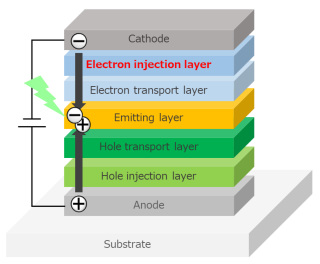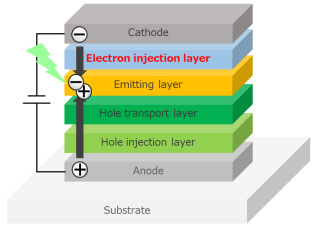Developing Novel electron injection material contributing to lower power consumption, longer operating lifetime and reduce cost of OLED
NIPPON SHOKUBAI CO., LTD. (Headquarters: Osaka, Japan, President: Yujiro Goto, hereinafter “Nippon Shokubai”), has developed novel electron injection*1 material in collaboration with Japan Broadcasting Corporation (Headquarters: Tokyo, Japan, President: Terunobu Maeda, hereinafter “NHK”), that contributes to lower power consumption, longer operating lifetime and lower cost of organic electroluminescence device (OLED).
Usually, alkali metal compounds have been used in OLEDs in order to smoothly supply electrons from the metal electrode to the organic material, but these compounds are highly reactive with organic materials and have been regarded as a factor in the degradation of OLED devices.
To address this issue, Nippon Shokubai and NHK have developed an efficient electron injection technology without the use of alkali metal compounds by using a large polarization*2 between the metals of electrode and the organic materials.
This time, using the findings in the development of this polarization-induced electron injection technology, we have developed a more efficient electron injection material. This material exhibits excellent electron injection performance compared to common electron injection materials made of alkali metals such as lithium fluoride and lithium-quinolinol complexes, which is expected to contribute to lower power consumption and longer lifetime of OLEDs.
In addition, we have discovered that the newly developed material facilitates direct electron injection from the cathode to the light-emitting layer, which is regarded as difficult. In general, OLEDs require an electron transport material to deliver electrons supplied from the cathode to the light-emitting layer. By eliminating the need for electron transport material, the OLED structure can be simplified, and lower costs can be expected by reducing the number of materials used in OLEDs and shortening the fabrication process.
*1 Supplying electrons from an electrode to an organic material.
*2 A state in which a positively charged part and a negatively charged part are generated.
【Contacts】
Corporate Communications Dept.,
NIPPON SHOKUBAI CO., LTD.
TEL: +81-3-3506-7605 E-mail: shokubai@n.shokubai.co.jp


[Files]